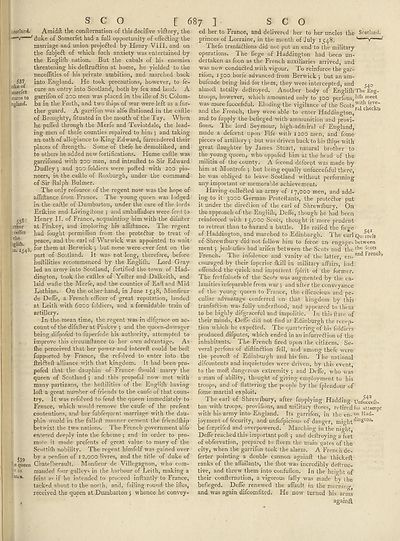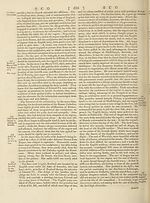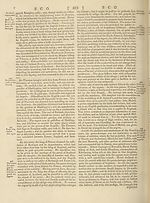Encyclopaedia Britannica, or, a Dictionary of arts, sciences, and miscellaneous literature : enlarged and improved. Illustrated with nearly six hundred engravings > Volume 18, RHI-SCR
(725) Page 687
Download files
Complete book:
Individual page:
Thumbnail gallery: Grid view | List view

, cotlan(i.
537
jike of
Toerfet
turns to
ngland.
532
rther
Icceffes
the
: igliili.
ui. 154S.
539
e queen
't to
inc*.
SCO [ 687 ] SCO
Amidft the confternation of this decifive vi£fory, the
duke of Somerfet had a full opportunity of eft'e&ing the
marriage and union proje&ed by Henry VIII. and on
the fubjedl of which fuch anxiety was entertained by
the Englifh nation. But the cabals of his enemies
threatening his deftru£tion at home, he yielded to the
neceffities of his private ambition, and marched back
into England. He took precautions, however, to fe-
cure an entry into Scotland, both by fea and land. A
garrifon of 200 men was placed in the ifle of St Colum-
ba in the Forth, and two ftiips of war were left as a fur¬
ther guard. A garrifon was alfo ftationed in the caftle
of Broughty, fituated in the mouth of the Tay. When
he palled through the Merfe and Teviotdale, the lead¬
ing men of thefe counties repaired to him •, and taking
an oath of allegiance to King Edward, furrendered their
places of ftrength. Some of thefe he demolilhed, and
to others he added new fortifications. Hume caftle was
garrifoned with 200 men, and intrufted to Sir Edward
Dudley } and 300 foldiers were polled with 200 pio¬
neers, in the caftle of Roxburgh, under the command
of Sir Ralph Bulmer.
The only refource of the regent now was the hope of
affiftance from France. The young queen was lodged
in the caftle of Dumbarton, under the care of the lords
Erlkine and Livingftone 3 and ambalfadors were fent to
Henry II. of France, acquainting him with the difafter
at Pinkey, and imploring his afliftance. The regent
had fought permiftion from the protestor to treat of
peace, and the earl of Warwick was appointed to wait
for them at Berwick 3 but none were ever fent on the
part of Scotland. It was not long, therefore, before
hoftilities recommenced by the Englilli. Lord Gray
led an army into Scotland, fortified the town of Had¬
dington, took the caftles of Yefter and Dalkeith, and
laid wafte the Merfe, and the counties of Eaft and Mid
Lothian. On the other hand, in June 1548, Monfieur
de Deffe, a French officer of great reputation, landed
at Leith with 6000 foidiers, and a formidable train of
artillery.
In the mean time, the regent was in difgrace on ac¬
count of the difafter at Pinkey 3 and the queen-dowager
being difpofed to fuperfede his authority, attempted to
improve this circumftance to her own advantage. As
fire perceived that her power and intereft could be beft
fupported by France, (lie refolved to enter into the
ftrifleft alliance with that kingdom. It had been pro-
pofed that the dauphin of France ffiould marry the
queen of Scotland ; and this propofal now met with
many partizans, the hoftilities of the Englifh having
loft a great number of friends to the caufe of that coun¬
try. It was refolved to fend the queen immediately to
France, which would remove the caufe of the prefent
contentions, and her fubfequent marriage with the dau¬
phin would in the fulleft manner cement the friendfhip
betwixt the two nations. The French government alfo
entered deeply into the fcheme ; and in order to pro¬
mote it made prefents of great value to many of the
Scottifh nobility. The regent himfelf was gained over
by a penfion of 12,000 livres, and the title of duke of
Chatelherault. Monfieur de Villegagnon, who com¬
manded four galleys in the harbour of Leith, making a
feint a^ if he intended to proceed inftantly to France,
tacked about to the north, and, failing round the ifles,
received the queen at Dumbarton j whence he convey¬
ed her to France, and delivered her to her uncles the Scotland,
princes of Lorraine, in the month of July 1 548. u—-y—j
Thefe tranfadtions did not put an end to the military
operations. The fiege of Haddington had been un¬
dertaken as foon as the French auxiliaries arrived, and
was now conducted with vigour. To reinforce the gar-
rilon, 1500 horfe advanced from Berwick 3 but an am-
bufeade being laid for them, they were intercepted, and 540
aim oft totally deftroyed. Another body of Englilh The Eng-
troops, however, which amounted only to 300 perfons,1,111 Irieet
was more fuccefsful. Eluding the vigilance of the Scots
and the French, they were able to enter Haddington/" C CC
and to fupply the befteged with ammunition and provi-
fions. The lord Seymour, high-admiral of England,
made a defeent upon Fife with 1200 men, and fome
pieces of artillery 3 but was driven back to his ftiips with
great flaughter by James Stuart, natural brother to
the young queen, who oppofed him at the head of the
militia of the county. A iecond defeent was made by
him at Montrofe 3 but being equally unfuccefsful there,
he was obliged to leave Scotland without performing
any important or memorable achievement'.
Having collefted an army of 17,000 men, and add¬
ing to it 3000 German Proteftants, the protestor put
it under the direilion of the earl of Shrewfbury. On
the approach of the Englifti, Defle, though he had been
reinforced with 15,000 Scots, thought it more prudent
to retreat than to hazard a battle. He railed the fiege r
of Haddington, and marched to Edinburgh. The earl Qu irels
of Shrewfbury did not follow him to force an engage-between
ment 3 jealoufies had arifen between the Scots and the the kots
French. The infolence and vanity of the latter, en-ancl Frenek’
couraged by their fuperior fkill in military affairs, had
offended the quick and impatient fpirit of the former.
'The fretfulnefs of the Scots was augmented by the ca¬
lamities infeparable from war 3 and after the conveyance
of the young queen to France, the efficacious and pe¬
culiar advantage conferred on that kingdom bv this
tranfafftion was fully underftood, and appeared to them
to be highly difgraceful and impolitic. In this ftate of
their minds, Deife did not find at Edinburgh the recep¬
tion which he expefted. The quartering of his foldiers
produced difputes, which ended in an infurre&ion of the
inhabitants. The French fired upon the citizens. Se¬
veral perfons of diftinftion fell, and among thefe were
the provofl: of Edinburgh and his fon. The national
difeontents and inquietudes were driven, by this event,
to the moft dangerous extremity 3 and Deffe, who was
a man of ability, thought of giving employment to his
troops, and of flattering the people by the fplendour of
fome martial exploit.
The earl of Shrew/bury, after fupplying Hadding. Unfuccefs-
ton with troops, provifions, and military (lores, retired fm attempt
with his army into England. Its garrifon, in the en-011 Hacl-
joyment of fecurity, and unfiifpicious of danger, might dil'Slon*
be furprifed and overpowered. Marching in the night,
Deffe reached this important poft 3 and deltroying a fort
of obfervation, prepared to ftorm the main gates of the
city, when the garrifon took the alarm. A French de-
ferter pointing a double cannon againft the thickeH
ranks of the affailants, the fliot was incredibly deftruc-
tive, and threw them into confufion. In the height of
their confternation, a vigorous (ally was made by ihe
befteged. Defle renewed the affault in the morning,
and was again difeomfited. He now turned his arms
againft
537
jike of
Toerfet
turns to
ngland.
532
rther
Icceffes
the
: igliili.
ui. 154S.
539
e queen
't to
inc*.
SCO [ 687 ] SCO
Amidft the confternation of this decifive vi£fory, the
duke of Somerfet had a full opportunity of eft'e&ing the
marriage and union proje&ed by Henry VIII. and on
the fubjedl of which fuch anxiety was entertained by
the Englifh nation. But the cabals of his enemies
threatening his deftru£tion at home, he yielded to the
neceffities of his private ambition, and marched back
into England. He took precautions, however, to fe-
cure an entry into Scotland, both by fea and land. A
garrifon of 200 men was placed in the ifle of St Colum-
ba in the Forth, and two ftiips of war were left as a fur¬
ther guard. A garrifon was alfo ftationed in the caftle
of Broughty, fituated in the mouth of the Tay. When
he palled through the Merfe and Teviotdale, the lead¬
ing men of thefe counties repaired to him •, and taking
an oath of allegiance to King Edward, furrendered their
places of ftrength. Some of thefe he demolilhed, and
to others he added new fortifications. Hume caftle was
garrifoned with 200 men, and intrufted to Sir Edward
Dudley } and 300 foldiers were polled with 200 pio¬
neers, in the caftle of Roxburgh, under the command
of Sir Ralph Bulmer.
The only refource of the regent now was the hope of
affiftance from France. The young queen was lodged
in the caftle of Dumbarton, under the care of the lords
Erlkine and Livingftone 3 and ambalfadors were fent to
Henry II. of France, acquainting him with the difafter
at Pinkey, and imploring his afliftance. The regent
had fought permiftion from the protestor to treat of
peace, and the earl of Warwick was appointed to wait
for them at Berwick 3 but none were ever fent on the
part of Scotland. It was not long, therefore, before
hoftilities recommenced by the Englilli. Lord Gray
led an army into Scotland, fortified the town of Had¬
dington, took the caftles of Yefter and Dalkeith, and
laid wafte the Merfe, and the counties of Eaft and Mid
Lothian. On the other hand, in June 1548, Monfieur
de Deffe, a French officer of great reputation, landed
at Leith with 6000 foidiers, and a formidable train of
artillery.
In the mean time, the regent was in difgrace on ac¬
count of the difafter at Pinkey 3 and the queen-dowager
being difpofed to fuperfede his authority, attempted to
improve this circumftance to her own advantage. As
fire perceived that her power and intereft could be beft
fupported by France, (lie refolved to enter into the
ftrifleft alliance with that kingdom. It had been pro-
pofed that the dauphin of France ffiould marry the
queen of Scotland ; and this propofal now met with
many partizans, the hoftilities of the Englifh having
loft a great number of friends to the caufe of that coun¬
try. It was refolved to fend the queen immediately to
France, which would remove the caufe of the prefent
contentions, and her fubfequent marriage with the dau¬
phin would in the fulleft manner cement the friendfhip
betwixt the two nations. The French government alfo
entered deeply into the fcheme ; and in order to pro¬
mote it made prefents of great value to many of the
Scottifh nobility. The regent himfelf was gained over
by a penfion of 12,000 livres, and the title of duke of
Chatelherault. Monfieur de Villegagnon, who com¬
manded four galleys in the harbour of Leith, making a
feint a^ if he intended to proceed inftantly to France,
tacked about to the north, and, failing round the ifles,
received the queen at Dumbarton j whence he convey¬
ed her to France, and delivered her to her uncles the Scotland,
princes of Lorraine, in the month of July 1 548. u—-y—j
Thefe tranfadtions did not put an end to the military
operations. The fiege of Haddington had been un¬
dertaken as foon as the French auxiliaries arrived, and
was now conducted with vigour. To reinforce the gar-
rilon, 1500 horfe advanced from Berwick 3 but an am-
bufeade being laid for them, they were intercepted, and 540
aim oft totally deftroyed. Another body of Englilh The Eng-
troops, however, which amounted only to 300 perfons,1,111 Irieet
was more fuccefsful. Eluding the vigilance of the Scots
and the French, they were able to enter Haddington/" C CC
and to fupply the befteged with ammunition and provi-
fions. The lord Seymour, high-admiral of England,
made a defeent upon Fife with 1200 men, and fome
pieces of artillery 3 but was driven back to his ftiips with
great flaughter by James Stuart, natural brother to
the young queen, who oppofed him at the head of the
militia of the county. A iecond defeent was made by
him at Montrofe 3 but being equally unfuccefsful there,
he was obliged to leave Scotland without performing
any important or memorable achievement'.
Having collefted an army of 17,000 men, and add¬
ing to it 3000 German Proteftants, the protestor put
it under the direilion of the earl of Shrewfbury. On
the approach of the Englifti, Defle, though he had been
reinforced with 15,000 Scots, thought it more prudent
to retreat than to hazard a battle. He railed the fiege r
of Haddington, and marched to Edinburgh. The earl Qu irels
of Shrewfbury did not follow him to force an engage-between
ment 3 jealoufies had arifen between the Scots and the the kots
French. The infolence and vanity of the latter, en-ancl Frenek’
couraged by their fuperior fkill in military affairs, had
offended the quick and impatient fpirit of the former.
'The fretfulnefs of the Scots was augmented by the ca¬
lamities infeparable from war 3 and after the conveyance
of the young queen to France, the efficacious and pe¬
culiar advantage conferred on that kingdom bv this
tranfafftion was fully underftood, and appeared to them
to be highly difgraceful and impolitic. In this ftate of
their minds, Deife did not find at Edinburgh the recep¬
tion which he expefted. The quartering of his foldiers
produced difputes, which ended in an infurre&ion of the
inhabitants. The French fired upon the citizens. Se¬
veral perfons of diftinftion fell, and among thefe were
the provofl: of Edinburgh and his fon. The national
difeontents and inquietudes were driven, by this event,
to the moft dangerous extremity 3 and Deffe, who was
a man of ability, thought of giving employment to his
troops, and of flattering the people by the fplendour of
fome martial exploit.
The earl of Shrew/bury, after fupplying Hadding. Unfuccefs-
ton with troops, provifions, and military (lores, retired fm attempt
with his army into England. Its garrifon, in the en-011 Hacl-
joyment of fecurity, and unfiifpicious of danger, might dil'Slon*
be furprifed and overpowered. Marching in the night,
Deffe reached this important poft 3 and deltroying a fort
of obfervation, prepared to ftorm the main gates of the
city, when the garrifon took the alarm. A French de-
ferter pointing a double cannon againft the thickeH
ranks of the affailants, the fliot was incredibly deftruc-
tive, and threw them into confufion. In the height of
their confternation, a vigorous (ally was made by ihe
befteged. Defle renewed the affault in the morning,
and was again difeomfited. He now turned his arms
againft
Set display mode to:
![]() Universal Viewer |
Universal Viewer | ![]() Mirador |
Large image | Transcription
Mirador |
Large image | Transcription
Images and transcriptions on this page, including medium image downloads, may be used under the Creative Commons Attribution 4.0 International Licence unless otherwise stated. ![]()
| Permanent URL | https://digital.nls.uk/193028132 |
|---|
| Attribution and copyright: |
|
|---|
| Description | Ten editions of 'Encyclopaedia Britannica', issued from 1768-1903, in 231 volumes. Originally issued in 100 weekly parts (3 volumes) between 1768 and 1771 by publishers: Colin Macfarquhar and Andrew Bell (Edinburgh); editor: William Smellie: engraver: Andrew Bell. Expanded editions in the 19th century featured more volumes and contributions from leading experts in their fields. Managed and published in Edinburgh up to the 9th edition (25 volumes, from 1875-1889); the 10th edition (1902-1903) re-issued the 9th edition, with 11 supplementary volumes. |
|---|---|
| Additional NLS resources: |
|

